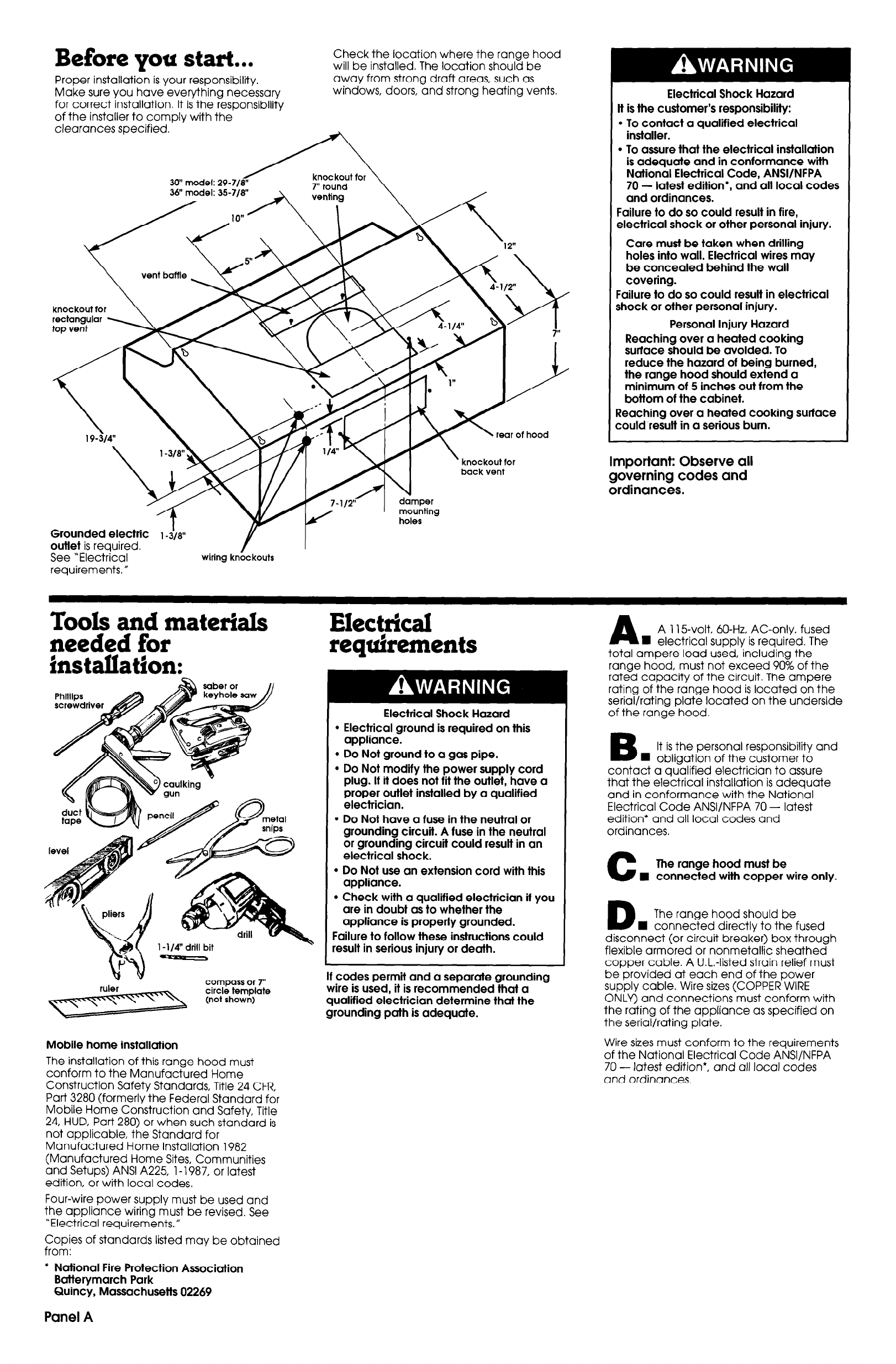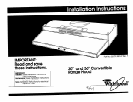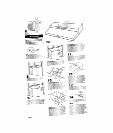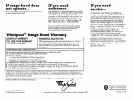
Before you start...
Check the location where the range hood
will be installed. The location should be
Proper installation is your responsibility.
Make sure you have everything necessary
for correct installation. It is the responsibility
of the installer to comply with the
clearances specified.
away from strong draft areas, such as
windows, doors, and strong heating vents.
30” model: 29-718
36’ model: 35-718”
knockout for
rear of hood
\
knockout for
back vent
mounting
holes
Grounded electric 1 -&w
outlet is required.
See “Electrical
wiring knockouts
requirements, fl
Electrical Shock Hazard
It is the customer’s responsibility:
l
To contact a qualified electrical
installer.
l
To assure that the electrical installation
is adequate and in conformance with
National Electrical Code, ANSVNFPA
70 - latest edition*, and all local codes
and ordinances.
Failure to do so could result in fire,
electrical shock or other personal injury.
Care must be taken when drilling
holes into wall. Electrical wires may
be concealed behind the wall
covering.
Failure to do so could result in electrical
shock or other personal injury.
Personal Injury Hazard
Reaching over a heated cooking
surface should be avoided. To
reduce the hazard of being burned,
the range hood should extend a
minimum of 5 inches out from the
bottom of the cabinet.
Reaching over a heated cooking surface
zould result in a serious burn.
Important: Observe all
governing codes and
ordinances.
Tools and materials
needed for
installation:
compass or 7”
circle template
(not shown)
Mobile home installation
The installation of this range hood must
conform to the Manufactured Home
Construction Safety Standards, Title 24 CFR,
Part 3280 (formerly the Federal Standard for
Mobile Home Construction and Safety, Title
24, HUD, Part 280) or when such standard is
not applicable, the Standard for
Manufactured Home Installation 1982
(Manufactured Home Sites, Communities
and Setups) ANSI A225, 1 - 1987, or latest
edition, or with local codes.
Four-wire power supply must be used and
the appliance wiring must be revised. See
“Electrical requirements.”
Copies of standards listed may be obtained
from:
* National Fire Protection Association
Batterymarch Park
Quincy, Massachusetts 02269
Panel A
Electrical
requirements
Electrical Shock Hazard
l
Electrical ground is required on this
appliance.
l
Do Not ground to a gas pipe.
l
Do Not modify the power supply cord
plug. If it does not fit the outlet, have a
proper outlet installed by a qualified
electrician.
l
Do Not have a fuse in the neutral or
grounding circuit. A fuse in the neutral
or grounding circuit could result in an
electrical shock.
l
Do Not use an extension cord with this
appliance.
l
Check with a qualified electrician if you
are in doubt as to whether the
appliance is properly grounded.
Failure to follow these instructions could
result in serious injury or death.
If codes permit and a separate grounding
wire is used, it is recommended that a
qualified electrician determine thal the
grounding path is adequate.
A
A 115-volt, 60-Hz, AC-only, fused
n electrical supplv is reauired. The
total ampere load used’including the
range hood, must not exceed 90% of the
rated capacity of the circuit. The ampere
rating of the range hood is located on the
serial/rating plate located on the underside
of the range hood.
B
It is the personal responsibility and
n obliaation of the customer to
contact a qualified electrician to assure
that the electrical installation is adequate
and in conformance with the National
Electrical Code ANSI/NFPA 70 - latest
edition* and all local codes and
ordinances,
C
The range hood must be
n connected with copper wire only.
D
The range hood should be
n connected directly to the fused
disconnect (or circuit breaker) box through
flexible armored or nonmetallic sheathed
copper cable. A U.L.-listed strain relief must
be provided at each end of the power
supply cable. Wire sizes (COPPER WIRE
ONLY) and connections must conform with
the rating of the appliance as specified on
the serial/rating plate.
Wire sizes must conform to the requirements
of the National Electrical Code ANSI/NFPA
70 - latest edition*, and all local codes
and ordinances.









